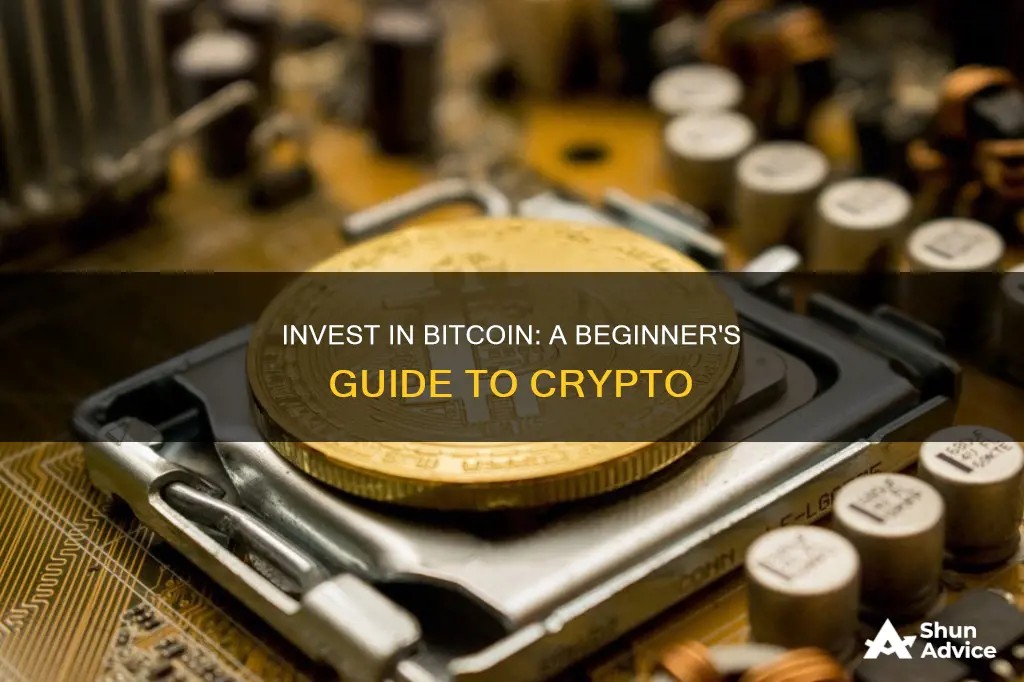
Bitcoin is a well-known cryptocurrency that offers an alternative form of money. It is a decentralised currency that operates without a central bank or single administrator, making it a peer-to-peer electronic currency system.
Investing in Bitcoin can seem complicated, but it isn't. It only requires an account at a service or a cryptocurrency exchange and a way to store your purchases safely.
1. Choose a crypto-trading service or venue: Exchanges are a convenient option because they offer a breadth of features and more cryptocurrencies for trading.
2. Connect your exchange to a payment option: Depending on the exchange, personal identification may be required. At most exchanges, you can connect your bank account directly or link it to a debit or credit card.
3. Place an order: Cryptocurrency exchanges have evolved and now mimic the same features as their stock brokerage counterparts.
4. Safe storage: Keeping crypto outside the exchange and in a personal wallet ensures that investors have control over the private key to the funds. An exchange wallet is offered, but not recommended, for large or long-term cryptocurrency holdings.
| Characteristics | Values |
|---|---|
| How to invest in Bitcoin | Choose a crypto-trading service or venue, such as Coinbase, Robinhood, eToro, Kraken, Gemini, Binance, Crypto.com, etc. |
| --- | --- |
| Connect your exchange to a payment option | You can connect your bank account directly or link it to a debit or credit card. |
| --- | --- |
| Place an order | Almost all crypto exchanges offer market and limit orders, and some also provide stop-loss orders. |
| --- | --- |
| Safe storage | Hot wallets (online wallets) and cold wallets (offline wallets or hardware wallets) |
What You'll Learn

Choosing a crypto-trading service or venue
There are several options for buying Bitcoin, each with its own advantages and disadvantages. Here are some of the most popular methods:
- Cryptocurrency exchanges: These are online platforms that allow users to buy and sell various cryptocurrencies, including Bitcoin. Examples include Coinbase, Gemini, Kraken, and Crypto.com. Exchanges provide a convenient way for investors to purchase and store Bitcoin, and they offer a range of trading features and tools. Some exchanges may require you to submit some form of ID to comply with anti-money laundering laws.
- Traditional stockbrokers: A few traditional brokers, such as Robinhood, Webull, TradeStation, and Fidelity, offer customers a way to buy and sell Bitcoin. These platforms often charge lower fees and may be more suitable for those already familiar with stock market investing.
- Peer-to-peer money transfer apps: Cash transfer services like PayPal, Venmo, or Cash App allow users to purchase, store, send, and sell Bitcoin directly through their apps. This option may be convenient for those who are already used to these interfaces.
- Bitcoin ATMs: These work like normal ATMs, but they allow you to buy and sell Bitcoin. They are often placed in locations where you would find regular ATMs, such as convenience stores. It's important to consider the fees charged and have a plan for where to send the Bitcoin once purchased.
- Bitcoin exchange-traded funds (ETFs): These are funds that are traded on exchanges like traditional stocks and track the price of Bitcoin. Examples include ProShares Bitcoin Strategy ETF (BITO), Valkyrie Bitcoin Strategy ETF (BTF), and VanEck Bitcoin Strategy ETF (XBTF). Bitcoin ETFs can be attractive to investors who want a regulated way to invest in Bitcoin and those who want to diversify their portfolio with stocks and cryptocurrencies.
- Bitcoin trusts and mutual funds: These funds, such as Grayscale Bitcoin Trust and Osprey Bitcoin Trust, are managed by investment professionals who make decisions about which assets to invest in and when to buy or sell them. The shares of these funds are traded on over-the-counter (OTC) markets, making them accessible to retail investors.
When choosing a crypto-trading service or venue, it's essential to consider factors such as security, fees, ease of use, and the range of features offered. It's also important to ensure that the platform is regulated and compliant with relevant laws. Additionally, always do your research and read reviews from other users before making a decision.
Litecoin's Long-Term Investment Prospects: Worth the Risk?
You may want to see also

Connecting your exchange to a payment option
It's important to note that fees vary for deposits and transactions via different payment methods. Using a credit card to purchase cryptocurrency can incur high transaction fees and interest charges, so it is generally advised to use cash or another cryptocurrency to make purchases. Additionally, some banks may question or stop deposits to crypto-related sites or exchanges. Therefore, it is recommended to carefully review the fees and consider using a debit card or bank account for your transactions.
If you're using a platform like PayPal to purchase Bitcoin, you can link your PayPal account as a payment processor to a crypto exchange like Coinbase or eToro. This allows you to use PayPal as a deposit method to fund your account. However, buying Bitcoin directly on PayPal may restrict your ability to move your Bitcoin to other platforms or wallets easily.
Bitcoin in India: Is It Worth Investing?
You may want to see also

Placing an order
Once you've chosen your exchange, you can place an order for Bitcoin. The amount of Bitcoin you can buy will depend on how much you want to spend and the exchange's minimum investment. For example, Coinbase requires a minimum investment of $1 or €1.
Some exchanges allow you to buy fractions of a single coin, so your initial investment could be as low as $25.
It's important to remember that investing in Bitcoin is very risky, so carefully determine your risk tolerance and review your investment strategy before purchasing any Bitcoin.
To place an order, you'll need to connect your exchange to a payment option. Depending on the exchange, you may need to provide personal identification information, such as a picture of your driver's license or Social Security card, as well as information about your employer and source of funds.
At most exchanges, you can connect your bank account directly or link it to a debit or credit card. While you can use a credit card to purchase Bitcoin, keep in mind that the volatility of cryptocurrency prices could increase the overall cost of purchasing Bitcoin when combined with a credit card's interest charges.
Fees vary for deposits and withdrawals via bank account, debit, or credit card, and exchanges also charge fees per transaction.
After you've placed your order, you'll need to decide what to do with your Bitcoin. You can use your coins to make online transactions, hold them for the long term in the hopes that they will appreciate in value, or perform day trading by buying and selling coins with other Bitcoin owners, usually facilitated by the cryptocurrency exchange.
Best POS Coins: Where to Invest Now?
You may want to see also

Safe storage
Hot Wallets vs. Cold Wallets
Firstly, understand the difference between hot wallets and cold wallets. Hot wallets are online wallets that are connected to the internet. They are typically apps on devices such as computers, phones, or tablets. These wallets generate the private keys to your coins on internet-connected devices. While hot wallets are convenient for quick transactions, they are more vulnerable to hacking and theft.
Cold wallets, on the other hand, are offline wallets that are not connected to the internet. They can be hardware wallets, such as USB drives, or paper wallets, which are physical printouts of your public and private keys. Cold wallets are considered much more secure than hot wallets but may require more technical knowledge to set up and use.
Choosing a Wallet
When choosing a wallet, consider the level of security you need and your comfort with different options. Here are some recommendations for both hot and cold wallets:
- Hardware Wallet: A hardware wallet, such as TREZOR, is a dedicated device designed to store your Bitcoins securely. It is simple to use and highly resistant to viruses, hackers, and keyloggers.
- Air-Gapped Wallet: An air-gapped wallet is a type of cold wallet that uses a computer with no internet connection to generate and store your private wallet keys. This method is safe from online threats but is still vulnerable to offline threats like hardware keyloggers or someone looking over your shoulder.
- Paper Wallet: A paper wallet is a piece of paper with your public and private keys printed on it. Many people laminate these wallets and store them in safe deposit boxes at banks or in a safe at home. However, be aware that paper can be lost, stolen, or damaged, so ensure proper security measures are in place.
- Hot Wallet Apps: If you choose a hot wallet, consider using reputable apps like Coinbase, Robinhood, or Blockchain. These apps offer varying levels of security, such as two-factor authentication and encryption.
Security Measures
Regardless of the wallet you choose, implementing strong security measures is crucial:
- Passwords and Two-Factor Authentication: Always use strong, unique passwords for your wallets and enable two-factor authentication if available.
- Private Key Security: Keep your private keys secret and secure. Do not share them with anyone. Store them offline if possible, and consider using a seed phrase (a series of words) to back up your private keys.
- Safe Internet Browsing: Be cautious when browsing the internet, especially on devices that store your private keys. Avoid clicking suspicious links or downloading unknown software.
- Regular Backups: Back up your wallet data regularly to multiple secure locations, such as USB drives, cloud storage, or trusted friends.
- Transaction Verification: Before sending Bitcoin, always double-check the recipient's address to ensure it is correct. Malware can sometimes change the address to an attacker's address.
Remember, the security of your Bitcoin investments is your responsibility. By following these safe storage practices, you can help protect your Bitcoin from theft and unauthorized access.
Exploring Bitcoin: A Thousand-Dollar Investment Journey
You may want to see also

Understanding the risks
Investing in Bitcoin and other cryptocurrencies is risky and volatile. Here are some of the key risks to be aware of:
Volatile and Fluctuating Market
The price of bitcoin is constantly changing and can be unpredictable. For example, in the space of a week in December 2017, the price of bitcoin topped $20,000 before dropping to below $14,626. With such an unpredictable market, there’s no telling if you will get a return on your investment.
Susceptible to Cyberattacks and Fraud
Cryptocurrency is technology-based, which leaves this investment open to cyberattacks. Hacking is a serious risk, and there is no way to retrieve your lost or stolen bitcoins. Many reports suggest that many buyers lose their investments on exchanges and mining losses. In addition, there is a fair amount of fraud in the bitcoin market, with fake exchanges duping unsuspecting investors out of their bitcoins.
Little or No Regulation
Currently, the bitcoin market is operating without any major regulations. The government doesn’t have a clear stance on cryptocurrency as it is too new. It is not taxed, which can make it enticing as an investment opportunity, but a lack of taxation could lead to problems should bitcoin pose competition for government currency. There’s no telling what the state of the bitcoin market could be in a few years.
Technology Reliance
Bitcoin is an online exchange that is entirely reliant on technology. Without the technology, cryptocurrency is worthless. With other forms of currency or investment, there is usually some physical collateral to fall back on. With bitcoin, owners are more vulnerable to cyber threats, online fraud, and system shutdowns.
Block Withholding
New bitcoins are created by solving mathematical equations called “blocks”. A mining pool can use computational power to mine a block and hide it from honest miners instead of reporting the new block to the network. This is a way for a select few to reap the benefits, while others are left with nothing.
Limited Acceptance as Currency
Bitcoin has been referred to as a Ponzi scheme, and some people believe that when the bubble bursts, bitcoin will become useless. There are few companies that accept bitcoin as a viable form of currency. Currently, some online stores and travel companies allow cryptocurrency exchanges.
Legal and Tax Complications
The regulation of cryptocurrencies remains in an unsettled state, and the requirements for reporting holdings are unclear. In the US, the IRS has defined cryptocurrencies as property rather than currencies, which means that individual investors are subject to capital gains tax laws when it comes to reporting cryptocurrency profits and expenses on their annual tax returns. There is also a risk that requirements for reporting foreign accounts will be extended to include cryptocurrency holdings.
Bitcoin Investment: Is the Crypto Bandwagon Still Accessible?
You may want to see also
Frequently asked questions
The best way to invest in Bitcoin depends on your goals. Some speculators may be happy with an account that makes investing in bitcoin easy, even if it requires higher fees. Some may want to buy and hold on for dear life ("HODL"), aiming for long-term appreciation, while others prefer frequent trades to capture profit from smaller day-to-day price fluctuations.
Bitcoin is a very high-risk investment because it’s a volatile asset. That means that Bitcoin values may rise or fall dramatically in value over a very short period—even as quickly as a few hours or days. Like all cryptocurrencies, Bitcoin has no intrinsic value. It’s not backed by any physical asset, like gold or silver, and there’s no central regulator to ensure that the value remains stable.
You can buy Bitcoin through a cryptocurrency exchange, brokerage, or another account with Bitcoin support. It’s as easy as buying stock and other common investments. Examples of dedicated cryptocurrency exchanges include Coinbase, Gemini, Kraken, and Binance. You can also buy Bitcoin through other financial and brokerage accounts, such as Robinhood, SoFi, and the Cash app from Square.







